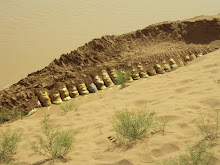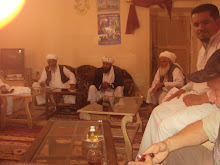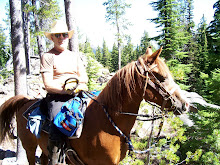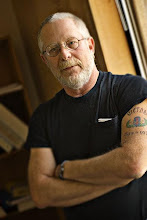Today is December 19 and I learned a new term from Simon in Counter-Narcotics: "PUFO". "Pack Up and Get the Fuck Out." There was an explosion about an hour ago and, of course, we all assumed it was a bombing related to Karzai's coming announcement about his cabinet and parliament appointments. So, we got ready to "PUFO" and were to be taken to our living compounds before they locked everyone down where they were located which, for me, would have been in the office. I broke down my computer and packed up all my gear, grabbed a bunch of reading material and left to catch my rig to the compound. Then, Mark, my main boss in law enforcement, came in and said it was a controlled detonation in one of the military bases and there were no security issues. Then I had to "UnPUFO", a phrase I made up on the spot which cracked everyone up. It was interesting that whenever the explosion went off, I didn't even hear it. Or maybe I just spaced it out.
Even though I have only been exposed to one bombing since arriving, maybe I've already assimilated the fact that it is a way of life here and there is nothing you can do about it. Thirty seconds after it happens, everything is back to normal. Well, I guess as normal as it can possibly ever be, here. It was the same way in Vietnam; just a fact of life in a war zone.This afternoon my big boss, Jean-Luc, took several of us to lunch at a wonderful Korean restaurant inside a very secure and heavily guarded compound. I think it is a private compound owned by the restaurant owners. We had this dish called “hot pot.” It is a wok on a gas hot plate and it cooks noodles, several different types of meat, scallions and veggies in a wonderful spicy hot sauce. Then you eat it over sticky rice. I also had spicy hot spinach with garlic and some really, really strong coffee. It was a nice change from the meals that are prepared for us at the office kitchen. There, we typically have things like barbecued chicken, beef stew, rice and beans, potatoes, soup with veggies, nice salads with cabbage, lettuce, tomatoes and cukes. They also make this wonderful, chewy flat bread. It’s kind of like tandoori, but way bigger. It’s funny, but I have never eaten "cukes" and tomatoes because for some reason I thought I didn't like them. Here, you eat what there is and now I guess I like them. The best part is that I pay $30 a month for breakfast and lunch. A dollar a day!!
I got a response from NATO today about my request to make contact with the Afghan EOD School. They forwarded it to someone who can make this happen. I am very excited about the opportunity to meet the trainers and see what they teach their students during a grueling six-month course and what they might offer our program with the Afghan Border Police. Given the remote locations of our posts on the Iranian border, the chances of getting EOD support when needed is virtually impossible. Unfortunately the same is true for close air support and med-e-evac. This has cost some of our ABP officers their lives. I have this idea that we might send some of our Afghan Border Police through the program and then have ABP EOD teams at the battalion (Kandak) level. Imagine the prestige for these men, and their units, and what they could then do for their fellow officers. A very nice Air Force 1st Lieutenant responded for NATO and kept calling me “sir.” I had to write back and tell him he could just call me “Stu” because I had been an enlisted man.
Today is December 22. I am in the UN “safe” (I’ll explain further on) compound at Mazar-i-Sharif and have been in this city since about 1PM, yesterday. It is 4:30PM, now, and the power has been off for about thirty minutes—oops…it’s back on. Oops…back off. Now, back on. It goes back and forth from city power (which is crap) to our own generators, which are quite good. We are in the far north of Afghanistan, close to the border with Uzbekistan. This is a major narcotics trafficking area, due to its remoteness and really shitty roads once you leave the city and head north for the border. Daud, Asef and I flew out of Kabul yesterday about 10:30AM on a UN DeHavilland Dash 8. It is a thirty-seven seat turbo-prop and was quite comfortable, especially since I had two seats to myself. We first landed in Fayzabad in the far northeast province of Badakhshan and it was a totally amazing experience. I had dozed off with my MP3 player blasting one of the newest Black Sabbath tunes into my ears They called themselves “Heaven and Hell” when they got back together in 2007—live at Radio City Music Hall—after their monster 1980 album by that name. If you don’t own this album, you should. And remember…”If it ain’t metal, it’s crap!”
When the plane hit the runway, I was jolted awake by the fact it was made of "PSP"—pierced steel plate. Holy crap, you Vietnam guys, does that ring a bell, or what? Many small fire bases and remote LZs in Vietnam had runways made of PSP and if you haven’t dropped suddenly onto one of these (usually very short) things…well. It could be pretty exciting since the plane typically stopped just before going into a rice paddy, or off the side of a mountain. When you took off, it was a total experience because these runways were so short you thought you would go off the end before lifting off, then, "whang,” almost straight up. For those of you who weren't in Vietnam, if you've seen the Mel Gibson-Robert Downey Jr. movie, "Air America," you have an idea of what I'm talking about. Fortunately, this one had plenty of length. We were only on the ground for ten minutes and then flew off to Kunduz back to the west in Balkh Province (regular runway) and, finally, into Mazar-i-Sharif. I have to tell you that flying over the snow-covered mountain ranges from Kabul to Mazar was a humbling experience, with them coming one after the other and each increasing in altitude and snow cover. They were stunningly beautiful and visually silent in their extreme remoteness and deep, white snow. You would see remote villages 17,000 feet below and wonder how they survived (which they have for thousands of years). Many of them had no roads in and out and are completely snow-bound for several months. I was trying to figure out what they use for heat since I saw no trees.
When you fly into Mazar (the short name), you immediately see the immense ISAF base called RC-North (Regional Command). I mean, huge—with long runways at the airbase, giant transports, advanced jet bombers and gobs of heavily armed helicopters from many nations. Everywhere there were armored vehicles of all shapes and sizes, also armed to the teeth with heavy machine guns, mini-guns, grenade launchers and all other sorts of hardware. It made me immediately feel very safe. This is where Daud, Asef and I would make our presentation to RC-North about our program along the Iranian border. Our driver from the local UNODC office was there to meet us at the airport and took us to the office where I met the Regional Manager. I later learned that both of them had come in from vacation to assist us. They saw that lunch was prepared–rice and vermicelli with raisins, a local favorite, and wonderful green tea.
We left for the RC-North base about two-thirty and got there about three. We were thirty minutes early and the officer who met us suggested we check out the bazaar. I bought a nice purple, black and white Afghan silk scarf which I now wear. Get this—the first officer we met was a Croatian captain. As soon as he saw me, he said, “Hey, EOD,” and pointed to his EOD badge. He was a captain Jerman and we shook hands heartily. What are the odds? Even, here, it is a small world. The meeting started late because we had to wait for the Rule-of-Law guy from the US State Department. He was the only American left in his office due to holiday leaves and he had already been to three meetings that day. Our host, a colonel from the Swedish Army, greeted us warmly, as did the American Army guys. ISAF meeting, there were representatives there from several of the NATO forces, as well as the local head of the Afghan Customs Department and a general from the Afghan Customs Police. I was unsure why no one was there from the Afghan Border Police, but it may have been because their trainers/mentors are with a US contractor and they have a very closed and secretive way of doing things. In fact, ten minutes into Daud’s part of our presentation, the two contractor reps got up and left without saying a word. If they had someplace to go and had to leave because the meeting started late, they could have said something. I thought it was very rude and very discourteous to our hosts and the Afghan government officials. They are running a mentoring program with the Afghan Border Police in the north so, naturally, we were very interested in talking to them and learning what they are doing.
Our presentation went extremely well and we were thanked profusely by our host, as well as the US Army personnel who were there. Daud did the photo part of the presentation and I handled the data part. Let me tell you about our officers and what they go through to protect their country from the scourge of opium products and precursor chemicals. In 2007, alone, they had 900 men killed in action--in all of the eight-and-a-half-years of this war, ISAF forces have lost something over 1,500. The ABP is paid $180 a month, hardly a living wage. Given the importance of what the ABP does, I do not understand this lack of a living wage. They have no benefits and usually live away from their families, which is a very big deal here. They get about $0.70 a day in food and live in remote areas in total bad guy country. It is not surprising that the desertion rate is very high and who can blame them? In one remote outpost on the Iranian border, there are seven ABP officers in a post that is nothing more than a large mud hut. No blast walls, no barbwire, no anti-personnel mines. They have no heavy machine guns or mortars. One hit from an RPG-7 or a 120mm mortar and the place turns to dust. Every time they seize drugs or weapons and munitions, they deny the Anti-Coalition Militias their main source of funding for weapons, munitions and explosives. So, when you think you're having a bad day, think about these men.
I’m not going to go into a whole lot of detail on the remainder of the trip to Mazar, other than to say that the next day, Daud and Asef took me to the Blue Mosque and we were able to walk around the entire place. As the pictures show, it is stunningly beautiful. At night, it is lit up like the biggest Christmas tree you have ever seen, with brilliant flashing red, green, yellow and blue lights. Apparently, they actually have a staff that plans the lighting display and they change the design every few days. Man, I’d hate to see the electric bill for this. As we walked in front of the main entrance, I noticed white birds and asked Daud if they were doves. They were—get this—white pigeons and they are revered as part of the mosque experience. I explained to him and Asef that in the States, the pigeons are mostly grey and we refer to them as “flying rats.” I told them why. As we walked a little further, there was a large area on the well manicured grounds that was surrounded by a low picket-type fence. Inside were all kinds of ducks—mallards, wood ducks, little white ducks—and the people were feeding them. A woman walked by me carrying a little black lamb in her arms to be blessed. As we walked around the perimeter, I noticed that many of the people there were looking at me. I may have been the first Westerner they had seen that was not carrying guns. As we were leaving, I saw an old man with deformed legs who was sitting on the sidewalk with a small hand broom and sweeping the dirt away. I was compelled to do something and I gave him 100 Afghan dollars, about $2.00 US—he kissed my hand and I got a little choked up.
The rest of the time in Mazar, until I left Wednesday morning on December 23, I stayed at the safe house, except for one trip to the UNODC office to take care of some admin issues. I worked online doing research on a number of topics, learning about the farm programs being run by some of the other people staying there. Eveline, who is from Austria, works with orphans. Most of their parents were killed by the Taliban or other Anti-Coalition Militias. As she told me of these kids’ plight, it made me remember how the Oregon State Council of Vietnam Veterans of America had assisted an orphanage in Cambodia. The children there were from the Montagnard, Rhade and other native tribes of Vietnam and their parents, as well, had been murdered by a despotic, despicable government. I knew right then I was going to do something to help Eveline. These kids have no heat in the orphanage that is reliable and winter is fast approaching the Northern provinces. They need socks, underwear, thermal underwear, pants and shirts, winter coats, gloves, shoes and boots. You Vietnam guys will be hearing from me later about this after I learn more detail about the kids’ ages and sizes, as well as the number of boys and the number of girls.
On December 24, I moved to my permanent room at UNICA1. I was really lucky in this regard because rooms are scarce and there are waiting lists for all four safe locations. UNICA1 is the best because it is only 200 yards from the office, the restaurant (if you want to eat there) is superb, there is a gym, bar, free coffee, laundry service and lots of Gurkha security. Here’s the best part. First, my room is on the second floor, off the ground in case of an incoming attack. I am in the last room on the left in my hallway, but at the end of the hall are two double doors leading to a suite that belongs to the a Close Protection Team. These guys are armed to the teeth. They saw my EOD tattoo and were very happy to have me as a neighbor…you never know whose skills will come in handy. You can see in the picture that I have a window that gets good sun and it opens so I can get fresh air and air out my stinky cigarette smoke. My new TV had only rabbit ears the first night because the cable has to be turned on. I was watching soccer from England on an Indian station. What a trip. The sportscaster was yelling in Hindi and it was a riot. All the other stations are in various Afghan and Arabic languages.
On Christmas, the restaurant staff outdid themselves and it was quite amazing and wonderful. We had brunch at 11AM—omelets, bacon, sausage, potatoes, croissants and other rolls, fresh fruit and pineapple juice (mimosas for those who wanted it), all kinds of pastries and cheeses (I had some really ripe Gorgonzola). The dinner that night was even more incredible. It was probably the best holiday meal I have ever eaten, even better than the ones I have prepared. There was turkey, roast beef and lamb; mashed and roasted potatoes; steamed carrots, squash and cauliflower; all kinds of fresh rolls, cheeses, fruit, shrimp cocktail and a wonderful peppery gravy. The desserts were…well…unreal. There was a chocolate roll cake that had absolutely the best chocolate I have ever tasted. At the end of the meal, Pope (the food services manager) brought in his staff and we gave them a standing ovation.
Well, I guess that’s enough got this post. My associate, Daud, who took the pictures in Mazar, is not here today because it is a religious holiday. I will add them later. I hope that everyone had a great Christmas, Hanukkah, Kwanzaa. And if you see the Kwanzaa-Bot, tell him I said, “Hi.” That’s for all you Futurama fans.
Sunday, December 27, 2009
Subscribe to:
Comments (Atom)
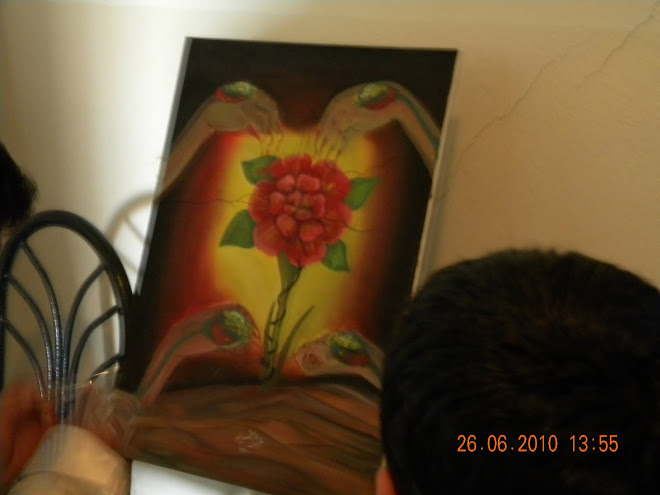.jpg)




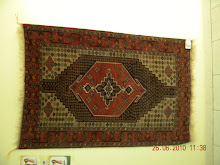.jpg)



